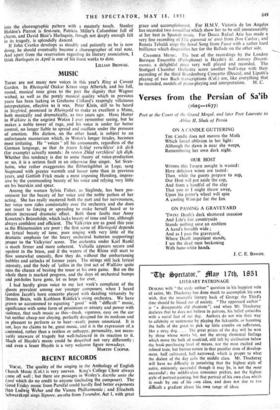MUSIC
THERE are not many new voices in this year's Ring at Covent Garden. In Rheingold Otakar Kraus sings Alberich, and his full, round, musical tone gives to the part the dignity that Wagner wished, as well as the purely musical quality which in previous years has been lacking in Grahame Clifford's raspingly villainous interpretation, effective as it was. Peter Klein, still to be heard in Siegfried, promised in Rheingold to make as excellent a Mime, both musically and dramatically, as two years ago. Hans Hotter in Walkiire is the angriest Wotan I ever remember seeing, but he makes a noble tower of rage, and his voice is under far better control, no longer liable to spread and oscillate under the pressure of emotion. His diction, on the other hand, is subject to an unfortunate mannerism which, in Wotan's longer tirades, becomes most irritating. He " voices " all his consonants, regardless of the German language, so that In 'even Schlaf verschliess' ich dick (for example) actually sounds: In yesten Zhlaf verzhliess' igh digit. Whether this tendency is due to some theory of voice-production or no, it is a serious fault in an otherwise fine singer. Set Svan- holm, who rather exaggerates the flibbertigibbet in Loge, sang Siegmund with greater warmth and looser tone than in previous years, and Gottlob Frick made a most imposing Hunding, impres- sive by the commanding beauty of his voice and relying very little on his bearskin and spear.
Among the women Sylvia Fisher, as Sieglinde, has been pre- eminent for the beauty of her voice and the noble pathos of her acting. She has really mastered both the part and her nervousness, her voice now rides comfortably over the orchestra and she does not resort to forcing or spreading to make herself heard or to obtain increased dramatic effect. Both these faults mar Anny Konetzni's Briinnhilde, which lacks beauty of tone and line, although always confident and efficient. The Valkyries are as good this year as the Rhinemaiden are poor ; the first scene of Rheingold depends on lyrical beauty of tone, pure singing with very little of the dramatic emphasis (or the heavy orchestral batteries supporting) proper to the Valkyries' scene. The orchestra under Karl Rankl is much firmer and more coherent. Valhalla appears secure and opulent in the brass, and if the waters of the Rhine still start to flow somewhat uneasily, flow they do, without the embarrassing bubbles and airlocks of former years. The strings still lack lyrical intensity, and the body of 'cellos in the first act of Walkiire quite miss the chance of beating the tenor at his own game. But on the whole there is marked progress, and the days of orchestral bumps and pot-holes have gone, let us hope for ever.
I had hardly given voice to my last week's complaint of the gloom prevalent among our younger composers, when I heard Gordon Jacob's horn concerto played with dazzling virtuosity by Dennis Brain, with Kathleen Riddick's string orchestra. We have grown so accustomed to equating " good " with " difficult " music, significance with some form of pessimism or anxiety and power with violence, that such music as this—fresh. vigorous, easy on the ear but neither cheap nor cloying, perfectly designed for its medium and as pleasant to perform as to hear—easily passes unnoticed. It is not, lays no claims to be, great music, and it is the expression of.a contented, rather than a restless or unhappy, personality, not neces- sarily unaware of tragedy but well-balanced in its reaction to it. Much of Haydn's music could be described not .very differently : and even a lesser Haydn is a very welcome figure nowadays. MARTIN COOPER.






































 Previous page
Previous page